Vessel plays host to a striking industrialised world of larger-than-life science and technology. There’s a palpable sense of mechanisation in most areas which reminded me no end of Abe’s Oddysee and Exoddus. Vast chambers house intricate Heath Robinson-esque cog-cobbled contraptions pumping, clunking, hissing and spitting, and in a world where liquid (or at least the Fluros created by it) play such an important role, pipes are everywhere, carrying the lifeblood that keeps these incredible machines operational. They’re intimidating creations at first, surrounded and operated by various pulleys, levers, pressure plates and dials with unknown functions (you don’t get Abe’s Oddysee and Exoddus-style signs nearby) but half of the fun is entering these daunting chambers and discovering exactly what does what.
The game largely takes place across three diverse areas, each divided into chapters. These areas are unlocked sequentially but the chapters, once discovered, can almost be completed in a non-linear fashion allowing you to come back to certain puzzles later on.
Vessel’s puzzles revolve around the use of different liquids and different Fluros. There are several types of Fluro, each with their own unique behaviour and as much as I’d like to describe them all, that would only spoil the surprise of the ones later on. The first Fluro you encounter however, loves to jump on pressure plates and if there’s one unpressed it will head straight for it. A little later on, another Fluro is introduced known as a ‘Chaser’ that indiscriminately hunts down Arkwright. Fluros are capable of accessing areas which Arkwright cannot, whether that’s down to their ability to pass through grates or to jump much further than he can. The idea is that their behaviours and abilities can be manipulated to solve puzzles.
New types of Fluros can only be created using devices specific to each area but eventually you are given the means by which you can ‘sample’ them in order to acquire a ‘seed’. Sampling involves luring a Fluro beneath (or above) a giant needle which is used to extract their gooey innards in order to create a seed. Seeds are portable mechanical devices which attract, coagulate then animate any type of liquid to create a specific Fluro depending on the seed. Once a seed is acquired you can drop them anywhere to create a Fluro providing there’s liquid nearby. I was really quite amazed by how cleverly these devices were put to use throughout the game.
There are a handful of different liquids in Vessel, each with their own characteristics. Some, like water, are thin and slosh about freely, while others, like lava, are more viscous and chunky, rolling over in clumps and sticking to things more. Some liquids also have adverse reactions to others so for instance, lava and water create steam on contact which in turn is useful for solving certain puzzles. Later on there are liquids that explode when mixed together, which again, is useful for solving certain puzzles.
When you couple these different liquids and their characteristics with the different Fluros and their behaviours the possibilities really start to open up in ways that mere trailers and videos simply can’t get across. It’s a pant-wettingly exciting set of mechanics. Take the Chaser Fluro for instance: made out of water, at worst, it’ll splash you. Made out of lava however, and suddenly it’s something you’d do well to steer clear of (or alternatively spray water at to its sizzling demise).
Then there’s the pressurised backpack that allows Arkwright to store certain liquids and spray or suck them up through a variety of different nozzles. These nozzles are unlocked and upgraded using a rare liquid called ‘Protoplasm’. Now, for whatever reason, I didn’t consult the journal when I discovered Protoplasm so I didn’t realise it was essentially liquid experience or ‘upgrade juice’ and proceeded to spray it everywhere wondering what the hell it did. Oops. The upgrade system in Vessel is a real anomaly and I mean this in two ways:
Firstly, it’s not simply a case of choosing an upgrade and hitting the YES button, no, there’s a machine that needs to be loaded up with Protoplasm in Arkwright’s lab and like most devices in Vessel, there are levers and pulleys and dials which all need to be operated to initiate various functions. Your first step is to move a lever back and forth to select an upgrade — this can be a new nozzle, an upgrade to an existing one, or increased capacity liquid tanks. Different upgrades require different amounts of Protoplasm. Once you’ve chosen your upgrade, Protoplasm has to be squirted into a receptacle that collects it in a tank. It’s possible to overfill the tank but thankfully there’s an overflow pipe that ejects any excess juice which in turn can be sucked back up again. Once the tank is full, a dial has to be rotated to transfer the liquid into another tank where the upgrade is created. When the upgrade is finished you have to release it by tripping a lever. That’s how Vessel rolls when it comes to upgrades and, I’ve got to say, as laborious as it sounds, you don’t have to upgrade that often and it’s quite nice going through these little motions anyway.
Secondly, and this is where the game stumbles somewhat, most of the upgrades don’t seem necessary to progress, which is understandable given that they can be acquired in any order. In most cases upgrades just make solving puzzles more convenient, for example, one nozzle allows you to launch Fluros without having to drop a seed and ‘water’ it, while a tank capacity upgrade just means you have to do less running back and forth to fill up. I only recall one or two instances where a puzzle required a particular upgrade (or was significantly easier because of it), which is a shame really. As mentioned earlier, Vessel’s puzzles revolve around the different Fluros and liquids, not the different upgrades, so as a result they’re rendered somewhat redundant. In Super Mario Sunshine there were many areas which were totally inaccessible until Mario acquired certain nozzles and I can’t help but feel that Vessel’s upgrade system would have benefited from a similar sort of approach.
If I was being nitpicky I could also complain about the slightly loosey-goosey platforming, or Arkwright’s somewhat rigid animation, or the rare occasion when a Fluro’s behaviour is hard to predict and manipulate, or when a Fluro spontaneously combusts for no apparent reason, or even the odd sound effect which is a bit too loud (I’m looking at you big metal clang), but these really are comparatively minor quibbles.


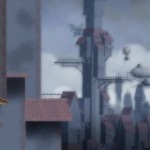
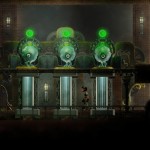
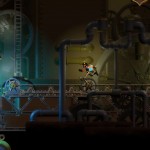
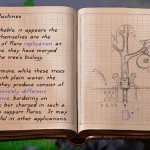
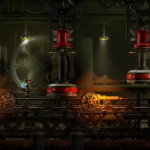


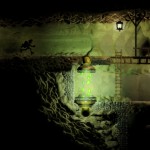
Looks interesting Geggis. The trailers make it look like there are some tricky and potentially timing based puzzles. Does it avoid becoming a chore to play?
This looks really interesting. Man, those videos – between the music and liquid effects – who says that parallax 2D is dead?
Great one, thanks Gregg.
@Helmut: it depends what you consider a chore really. There are a few timing based puzzles yes, but overall there’s a nice blend. I found it challenging throughout without ever feeling unfair or burdensome.
Edit: just watching the video back to jog my memory, most of the puzzles involving timing are fairly straightforward providing you have a plan and have all your Fluros in place and ready to go. I had a lot of fun setting up these solutions and hoping that I could execute them properly. If I remember rightly though, there are few puzzles, if any at all, that involve numerous successive timed elements.
Something along the lines of the game having enough learnable material to keep it fresh and interesting. SpaceChem, for all it’s wicked design and neat mechanics, consistently turns you around (after having spent 4 or more hours on the last problem) and feeds you a bigger harder problem. Hardly the reward you were looking for. The graphics of the fluids in Vessel look really intriguing, but does it stay fun and interesting all (or even most) of the way through?
I’d say so yes. Each area introduces at least a single new Fluro and liquid meaning the puzzles (that revolve around these things) are never quite the same. As you progress, each chapter within an area puts a slightly different spin on the new mechanics. The challenge doesn’t come from old mechanics being stacked on top of each other puzzle after puzzle until you’ve got some sort of stewed spaghetti to untangle (which I kind of get the impression SpaceChem does despite its tight design and mechanics), it comes from new mechanics requiring new ways of thinking. Kind of like Braid and World of Goo.
Edit: actually, that’s probably why I stuck with Vessel, Braid and World of Goo; the mechanics were refreshed enough to sustain my interest, whereas SpaceChem doesn’t really seem to do that, it seems to layer them up increasing each puzzle’s complexity as well as difficulty.
Edit2: To put it another way: unlike SpaceChem, Vessel is probably more about mental agility rather than mental strength and endurance.
[…] Gregg B on Vessel […]